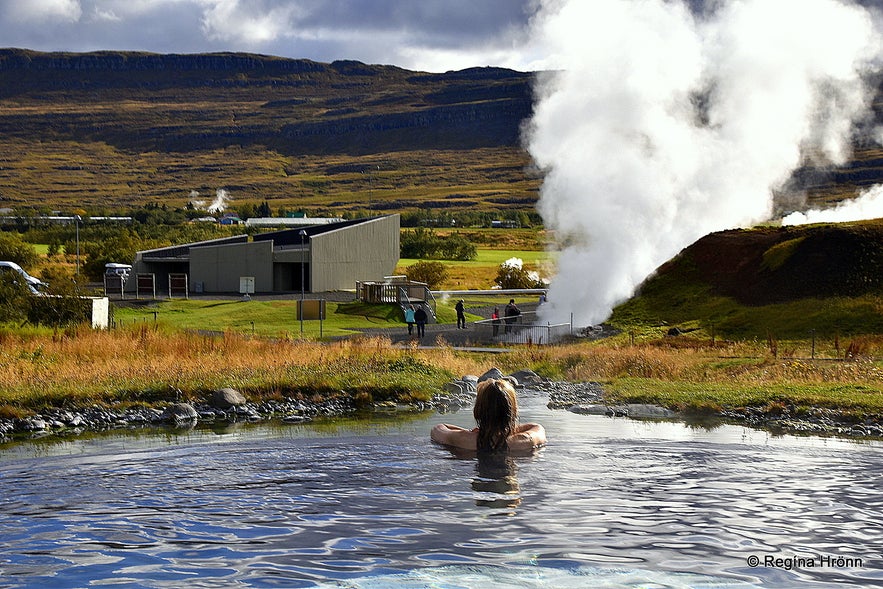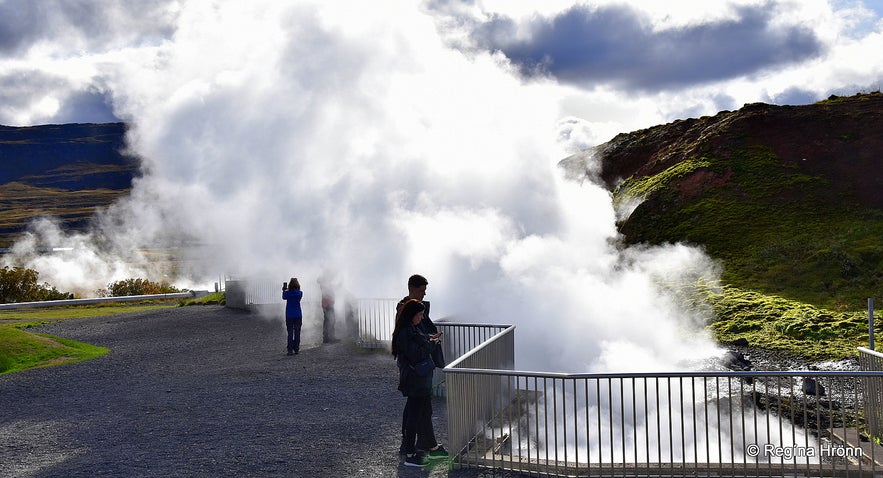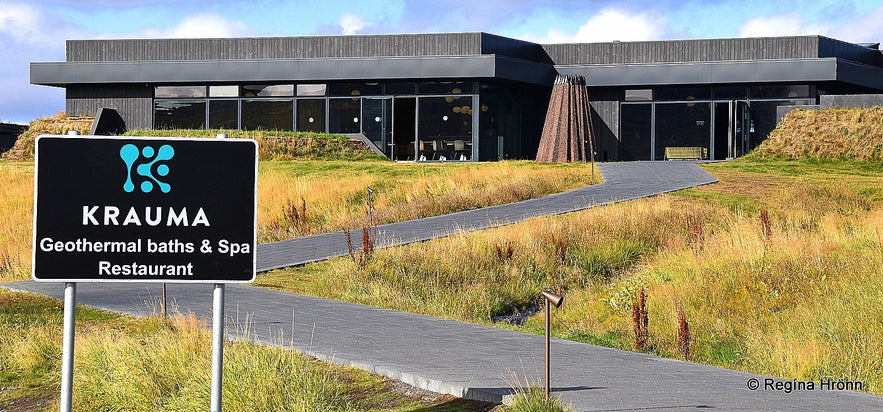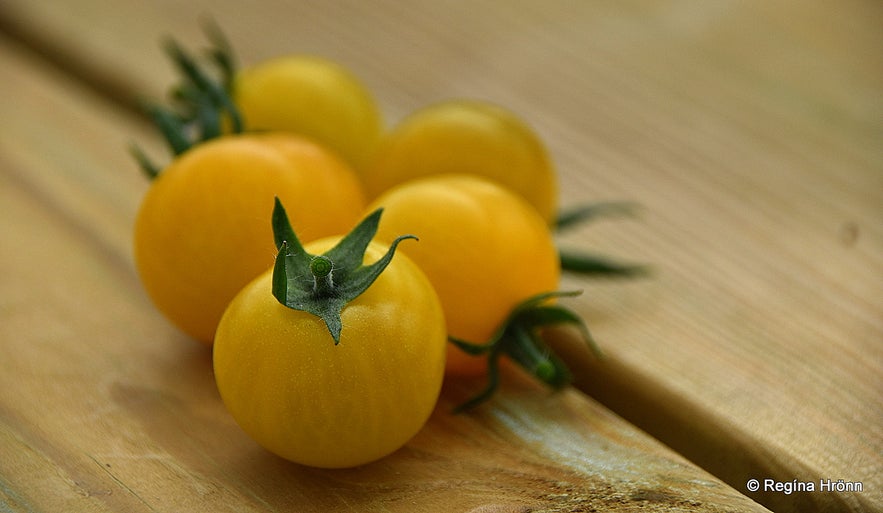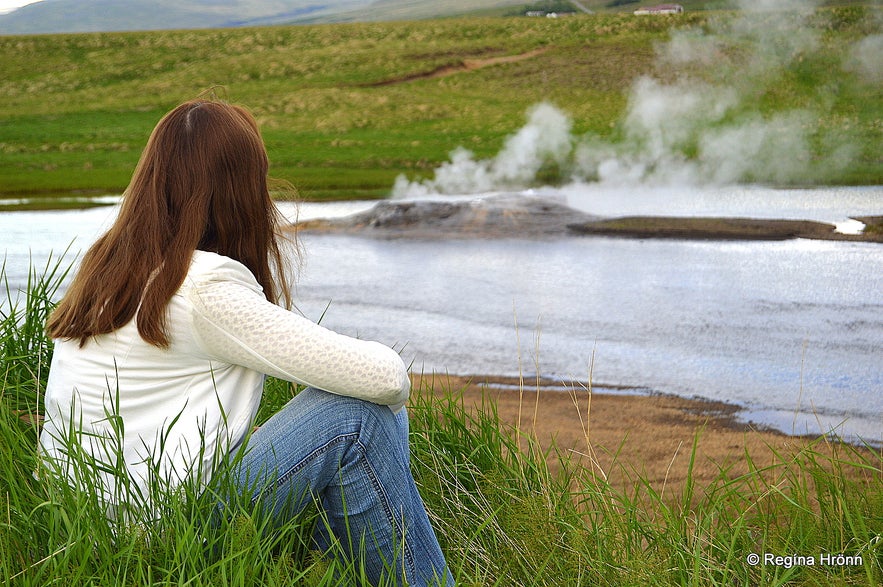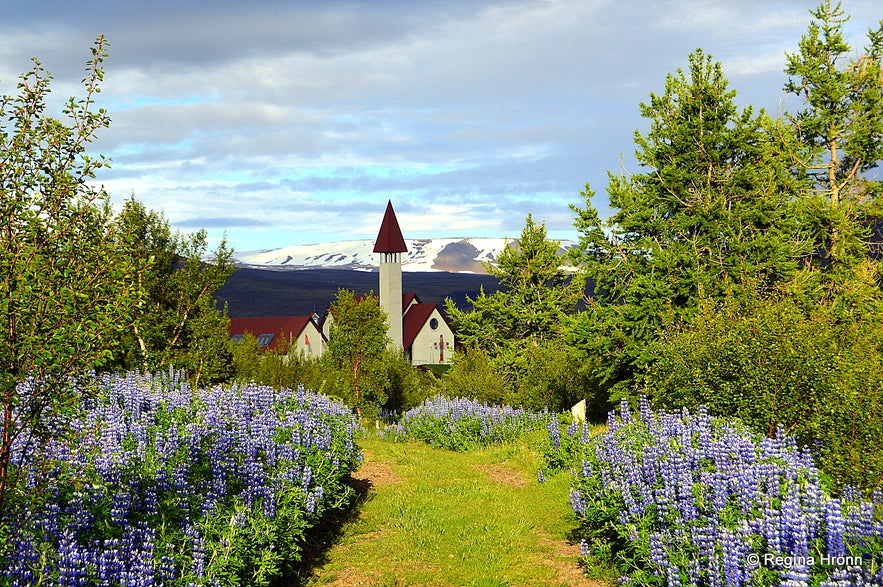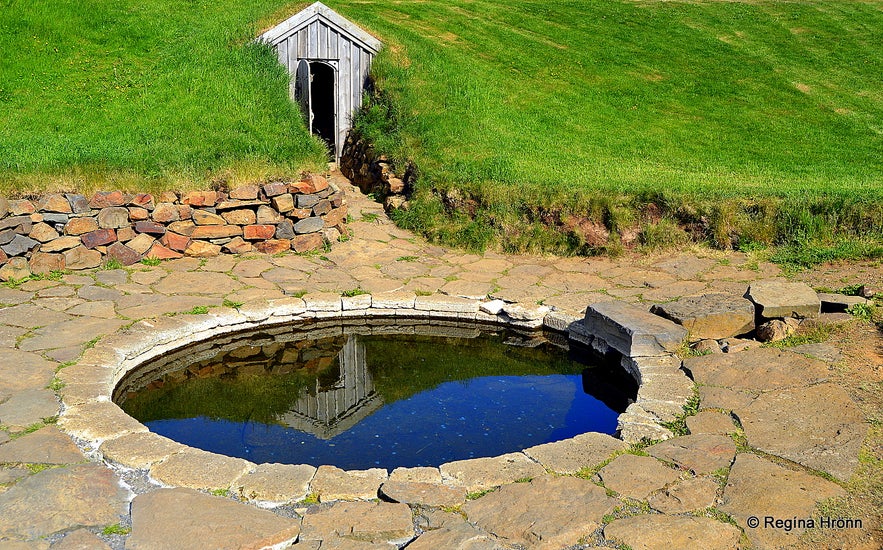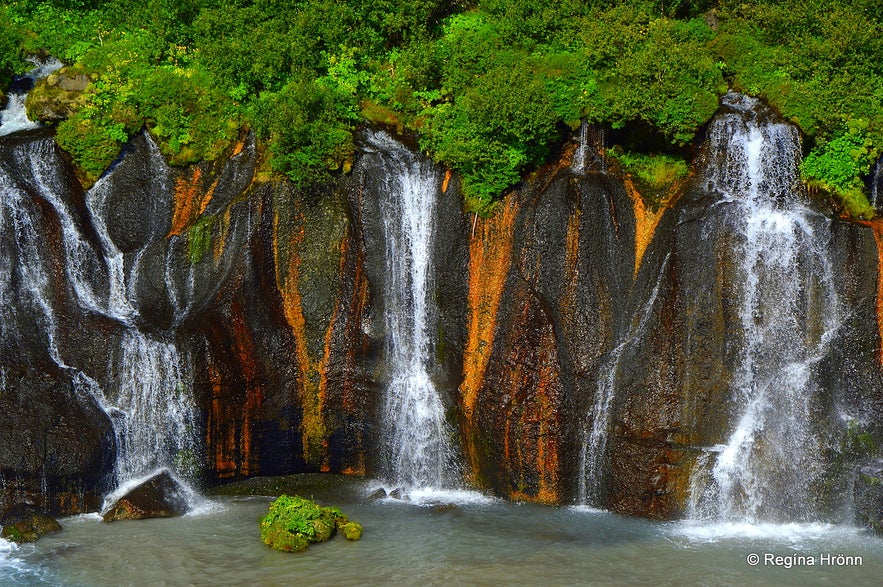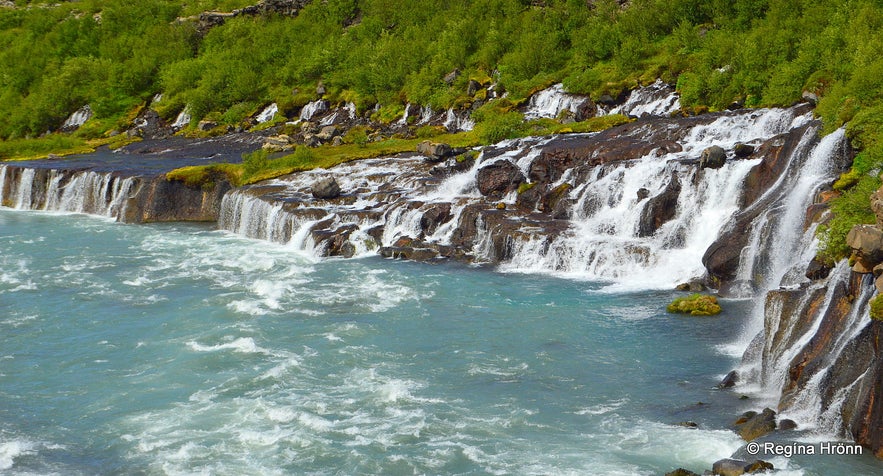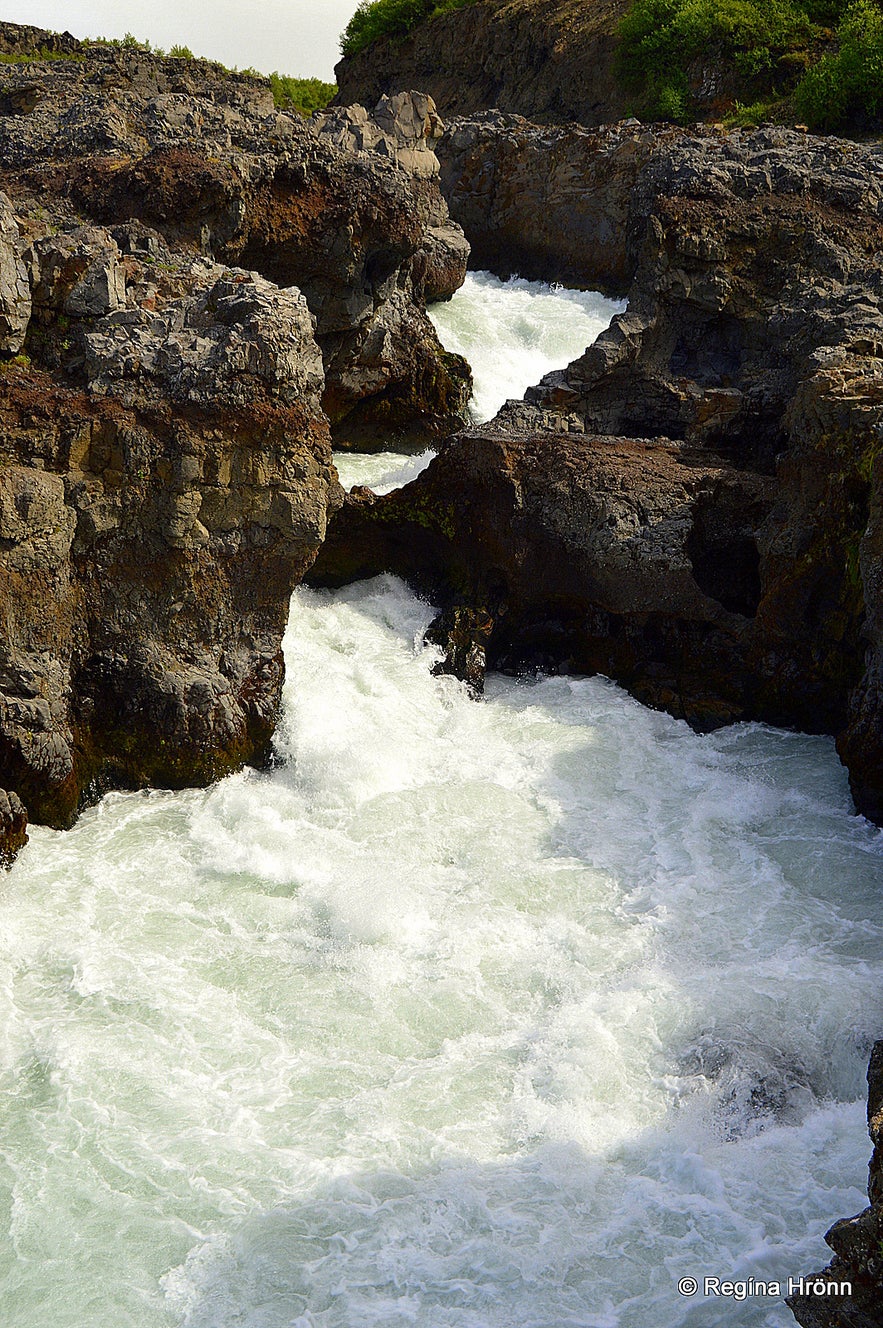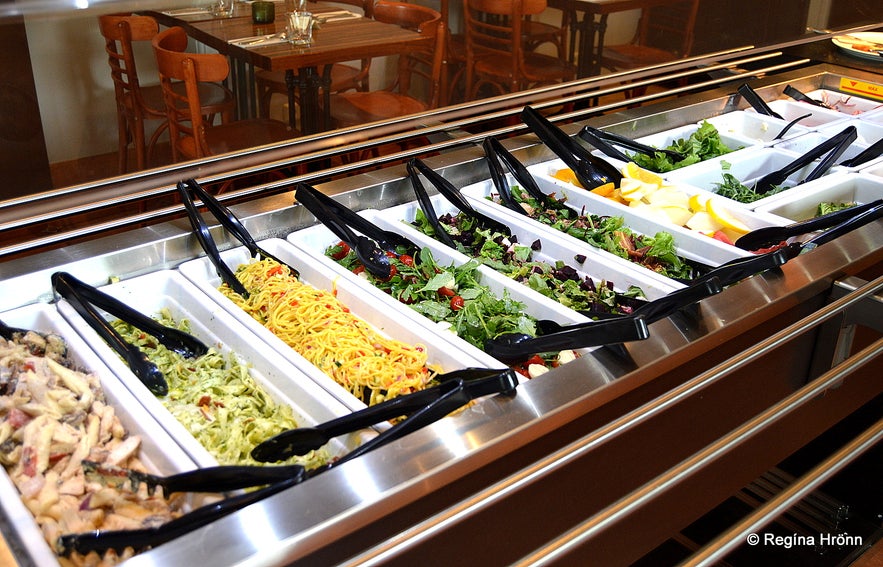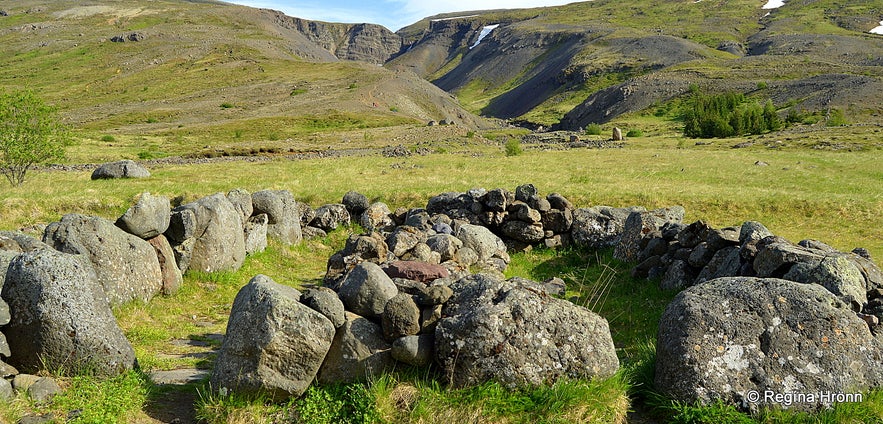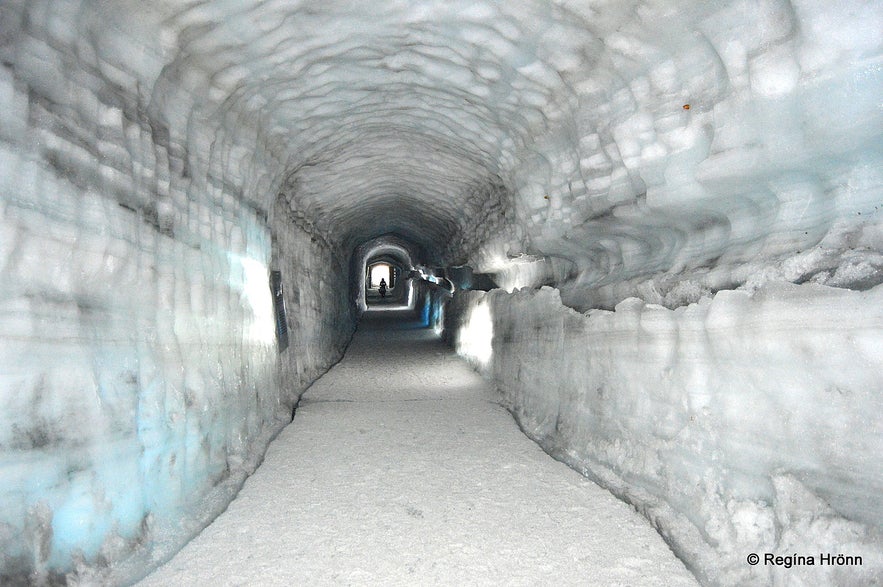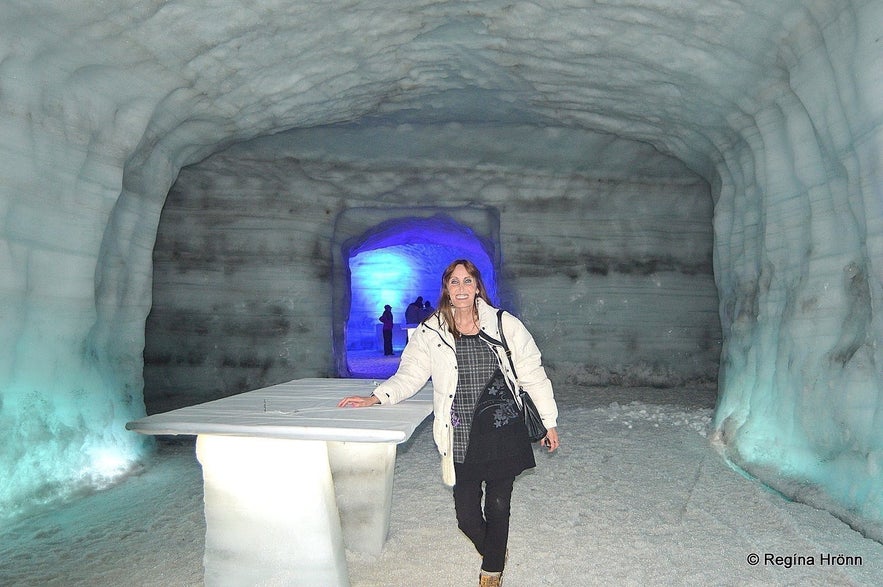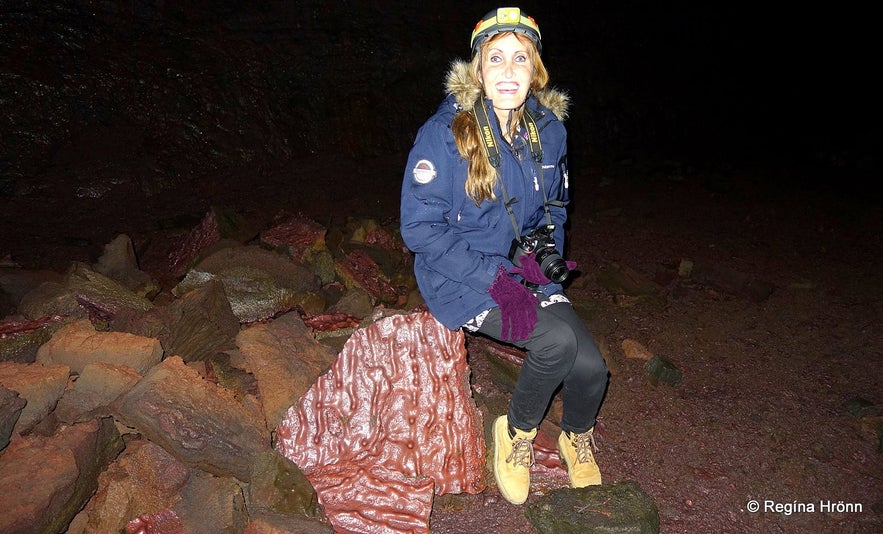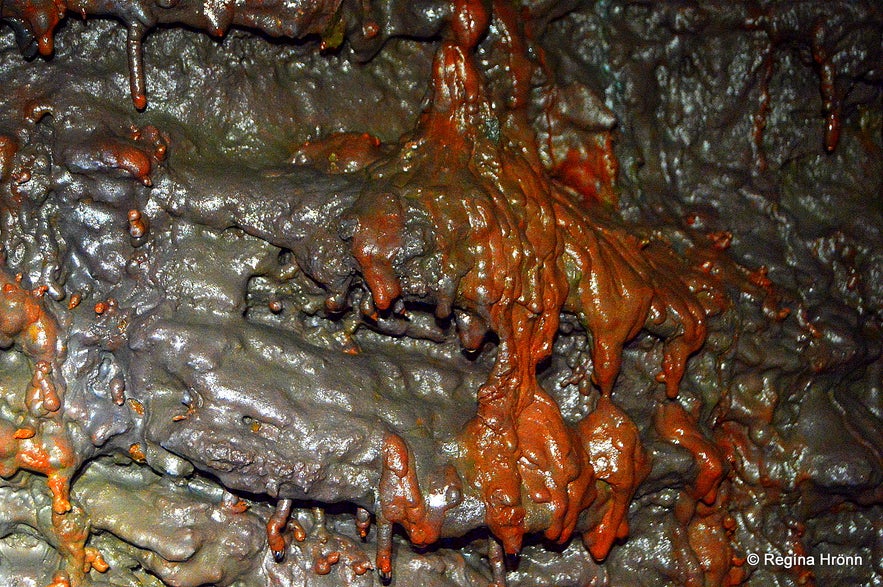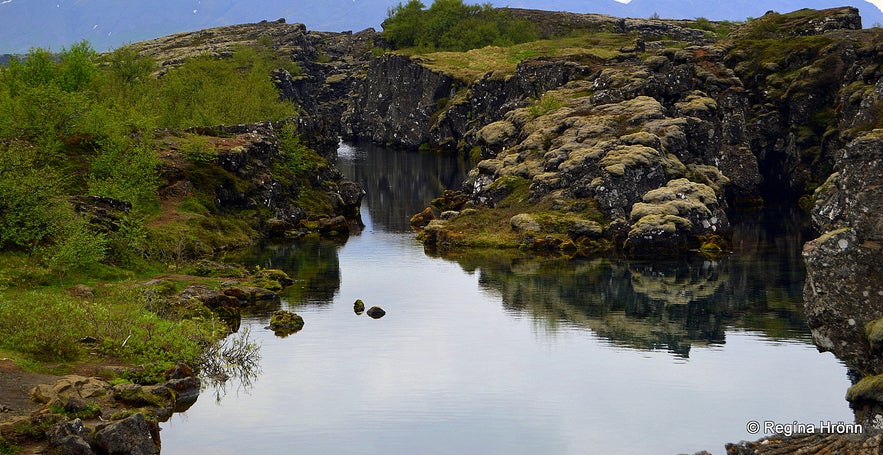
The spectacular Silver Circle in West-Iceland

- Deildartunguhver hot spring
- Krauma Spa - Geothermal Baths and Spa
- Tomatoes and other yummy food
- Árhver/Vellir - a hot spring in the middle of a river
- Reykholt - a historic site
- Hraunfossar waterfalls
- Barnafoss waterfall
- Húsafell
- Húsafell - Snorri and Páll
- Into the Glacier
- Víðgelmir - the Cave
- Þingvellir National Park
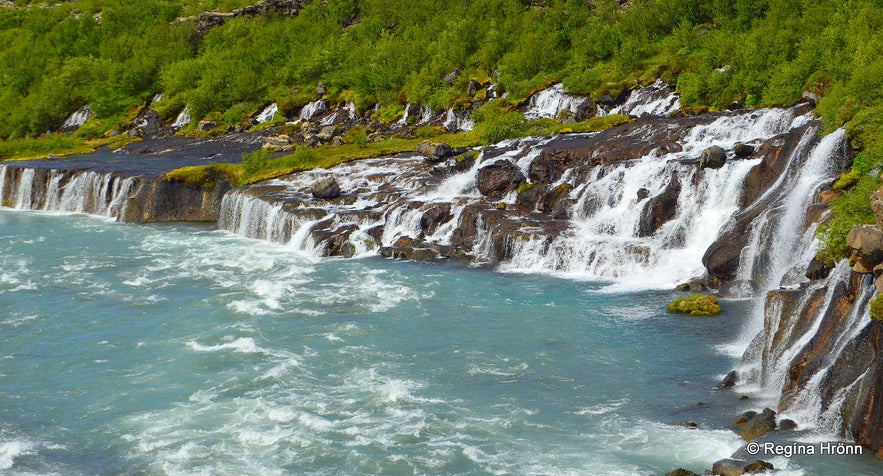
The Golden Circle in South-Iceland is the most popular route in Iceland, with its beautiful waterfalls, geysers and historic sights. But there is another route in West-Iceland, which is also worth a visit; the Silver Circle of Iceland. Then we have another very popular circle up north called the Diamond Circle. I refer to these 3 circles as the Jewel Circles of Iceland.
On the Silver Circle, you will find beautiful waterfalls coming straight from a lava field, the most powerful hot spring in Europe, a hot spring Spa, one of the historic sites in Iceland and archaeological remains, a spectacular lava cave and the man-made ice cave tunnel, dug into Iceland's second-largest glacier.
I am going to show you the main stops in my travel-blog with side-blogs if I have written about each location in more detail.
Top photo: Hraunfossar watwerfalls
Deildartunguhver hot spring
Soaking in Krauma by Deildartunguhver
Iceland is well-known for being the land of ice and fire due to its many glaciers and volcanoes. In West-Iceland you will find Deildartunguhver, which is the largest geothermal hot spring in Europe. It provides 180 l/sec of 97° hot water.
Deildartunguhver geothermal spring is a series of hot springs covering an area of 50 meters and only 40% of the geothermal spring water can be seen on the surface. The main area is by a clay hill, which goes by 2 names, Laugarhóll and Hverahóll hill.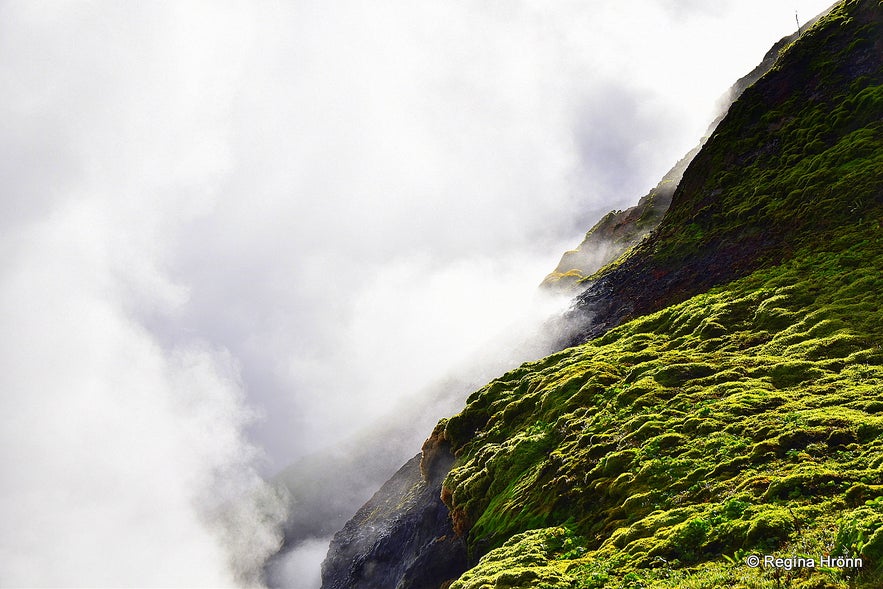
Deildartunguhver hot spring
There is so much steam emission from the geothermal water that it is difficult to get a good photo, as you get engulfed by the steam and the camera gets wet in the process.
I usually stand by the hot spring for a long time, drenched from the steam, trying to get a relatively good photo of the colourful rocks in Deildartunguhver. 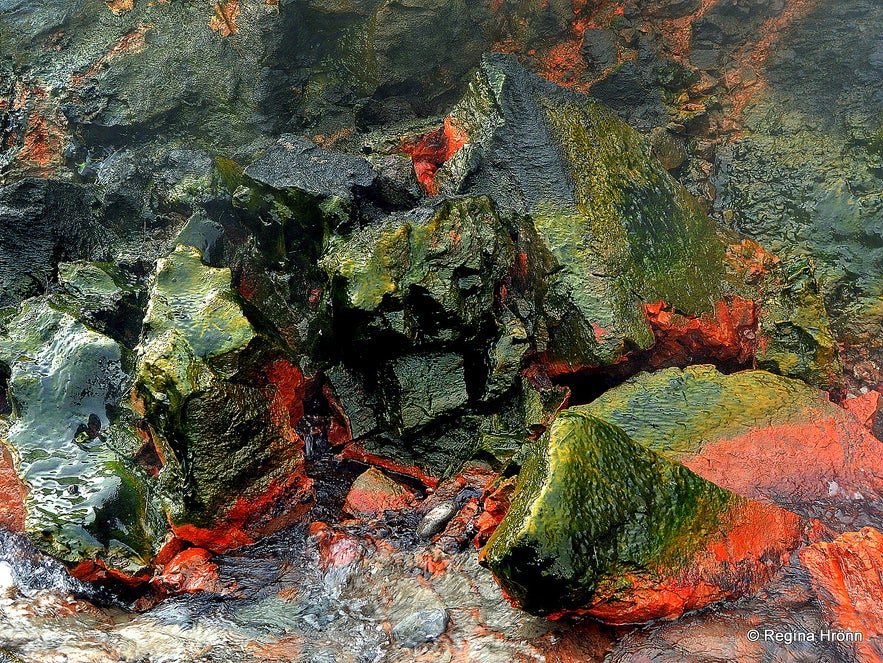
Deildartunguhver hot spring
The rocks sure are colourful - due to the red colour, one of the vents in Deildartunguhver got the name Sláturhver or Slaughter hot spring! It is easy to imagine why when looking at my photo above. The moss adds beautiful green colour to the redness of the lava in Deildartunguhver.
A special type of hard fern (blechum spicant), which can not be found elsewhere in Iceland, grows by Deildartunguhver.
Deildartunguhver is harnessed and used for heating up the houses in the nearby towns Akranes (64 km away) and Borgarnes (34 km away).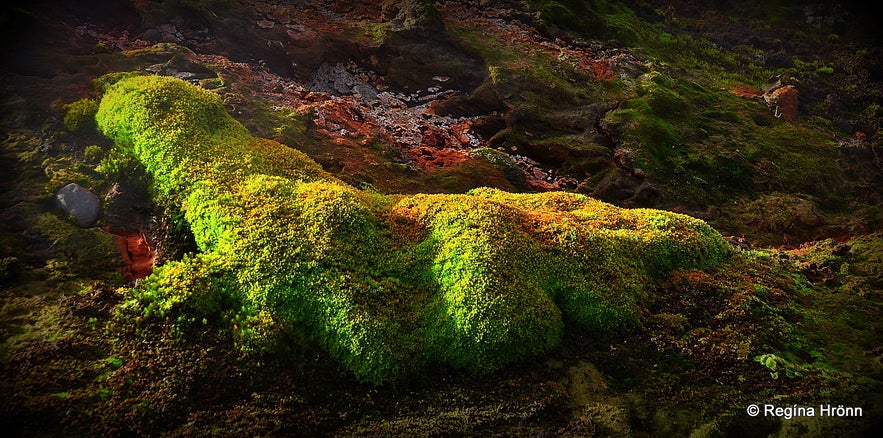
Deildartunguhver hot spring
Be very careful while visiting Deildartunguhver, as it is boiling hot and it bubbles and boils and spurts a whole lot. You can walk right up to it, but there is a railing right in front of it for our safety.
I got very startled during one of my visits to Deildartunguhver; I saw footprints inside the fence and all the way up the hill! Stepping inside the fence of the most powerful hot spring in Europe is strictly forbidden and life-threatening!
The geothermal water is at a boiling point and no Icelander would ever think of doing this as the danger is so evident.
A couple of years ago Deildartunguhver went amok and started spouting hot water left and right. Secure railings had to be put up to keep people safe.
Deildartunguhver hot spring
We first and foremost want our foreign guests to stay safe in our country, so please heed my advice and don't go too close to the hot springs.
The hot spring gets its name from a farm, Deildartunga, which is close by.
Krauma Spa - Geothermal Baths and Spa
Krauma Spa - Geothermal Baths and Spa
A lovely new addition to Deildartunguhver geothermal hot spring is Krauma Spa, which is open all year round. Here you will find 6 baths, 5 with warm water from Deildartunguhver hot spring, and 1 with cold water coming from the former glacier Ok.
I think it is the perfect combination of Iceland; geothermal water heated by the Icelandic volcanoes and ice-cold water from a glacier - it doesn't get more authentic than this :)
I had often thought that Deildartunguhver needed a geothermal bath so I was thrilled to hear about Krauma.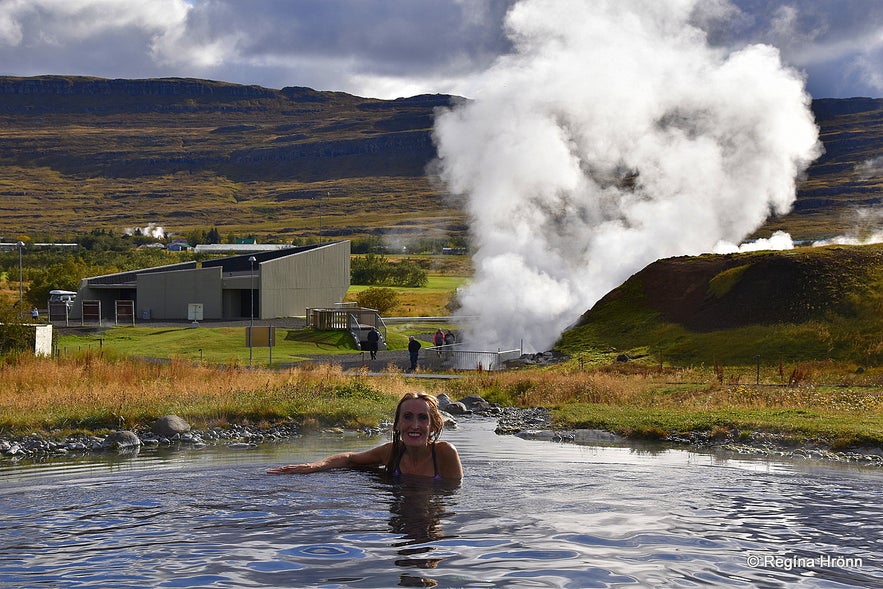
Soaking in Krauma
It wasn't until the summer of 2019 though that I got the opportunity to visit Krauma. I was travelling in Borgarfjörður with my mother and had invited her for a stay at Hotel Hraunsnef.
As the weather was glorious, sunshine and warm, I invited her for a dip in Krauma Spa.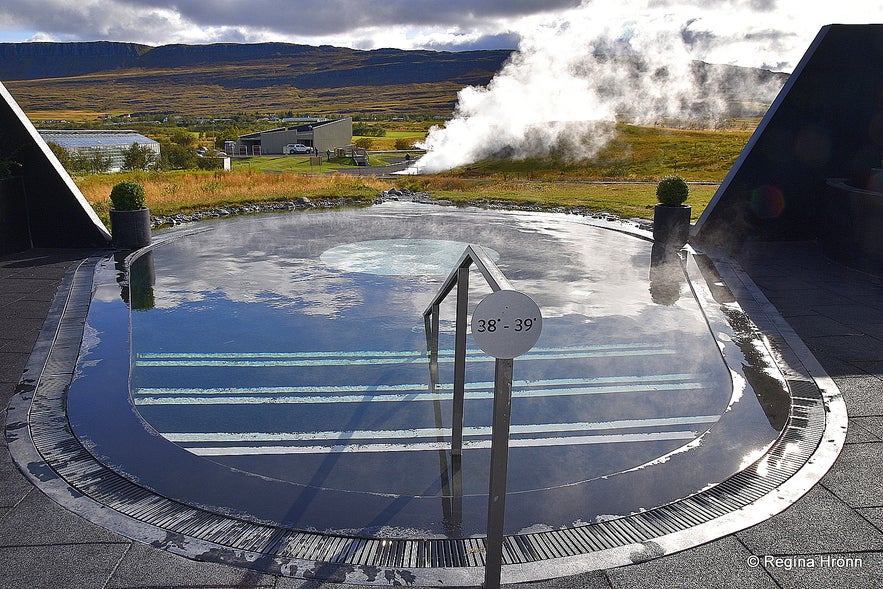
Krauma spa
We love hot water, so we dipped into the 38-39 degrees Celcius pool and enjoyed the view of Deildartunguhver. It is an incredible experience being able to soak in the geothermal water from the most powerful hot spring in Europe - and enjoying the view of the same hot spring at the same time.
We soaked in the pool for the longest time and then stepped into the relaxation room next to the bathing area. There we relaxed by the fireplace listening to soothing music - just heavenly.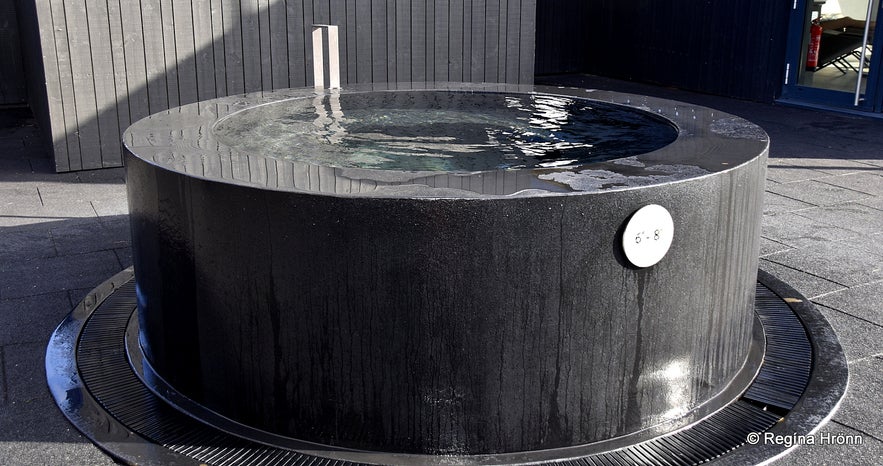
For the more daring ones - cold water 5-8 degrees C from the former glacier Ok. Don´t accidentally step into this one
We spent some 2 hours in the hot pools and in the relaxation area before we headed to our hotel.
I talked to the manager of Krauma before I left and he told us that Krauma is equally popular amongst Icelanders and foreigners. I am glad to hear that as we locals love this area and visit it often as it is so close to Reykjavík. 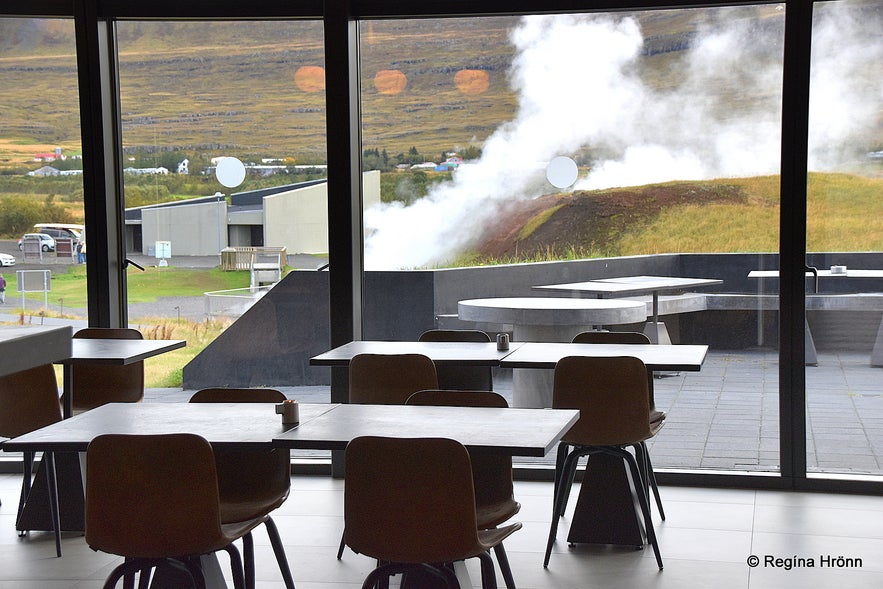
Krauma restaurant with a view of Deildartunguhver
It is very nice to know about this stop on the way, where we can dip into a hot pool and have lunch or dinner at the Krauma restaurant. A lovely addition to the travel services on the Silver Circle :)
Tomatoes and other yummy food
Organic tomatoes
There are a lot of greenhouses in this area as they make use of the geothermal heat. By Deildartunguhver you can buy new tomatoes which are grown on the spot. And some organic carrots.
The latest addition to Deildartunguhver is a café inside a greenhouse! We bought some coffee and organic tomatoes and brought them inside the warmth of the lovely greenhouse where we were surrounded by tomato plants.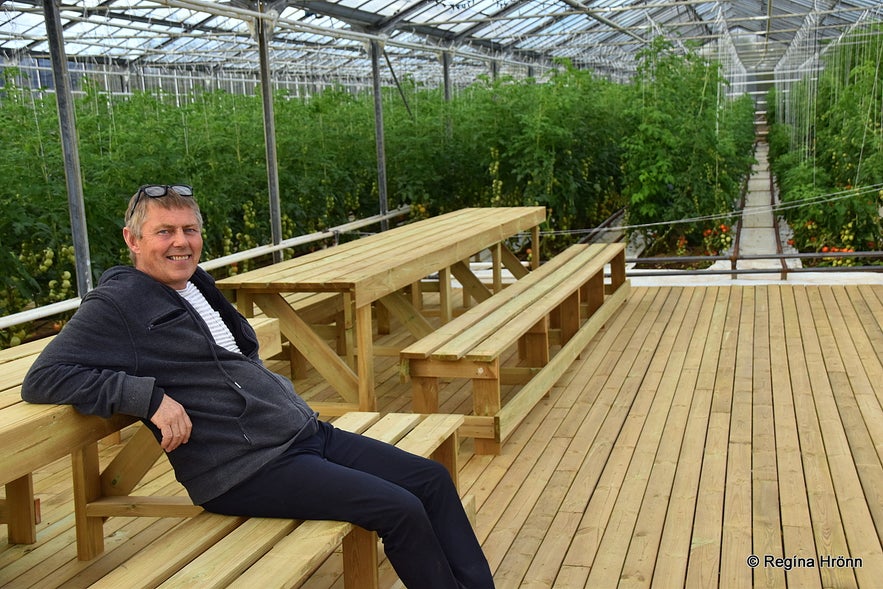
Bragi at Staldrið
You will find a food truck called Staldrið next to the greenhouse. It is run by Bragi (see my photo above). Bragi joined us in the greenhouse and told us about his produce.
I always value local knowledge when I am travelling around Iceland and cherish the time spent with the farmers and local people as I learn a lot from them.
Árhver/Vellir - a hot spring in the middle of a river
Árhver hot spring in the middle of a river
Árhver, the hot spring in the middle of the river, is the least visited of these locations on the Silver Circle, but seeing that I love this little hot spring the I add it here in my travel-blog.
The hot spring is located in the middle of the Reykjadalsá river and the only indication of this hot spring from afar is that you will see steam coming from the river.
I shot a video of it so you can see how special it is.
This hot spring goes by 4 names; Árhver, Vellir, Vellindishver and Vellineshver hot spring. It has been called Iceland's most peculiar hot spring due to its location. It consists of some 6 vents on small sand flats and the rock is made of concreta thermarum, a.k.a. hot spring clay. The water is around 100°C and the flow is 10-15 litres per second.
I have written a special travel-blog about this most peculiar hot spring:
Árhver - the geothermal hot spring in the middle of the river
Reykholt - a historic site
Beautiful Reykholt in Borgarfjörður
Reykholt is the next stop on the Silver Circle. It is one of the most historic sites in Iceland; Reykholt was an ecclesiastical, educational and cultural centre back in medieval times.
Reykholt was also the home of the noted Snorri Sturluson (1179-1241). Snorri was a Saga writer, politician, poet and a historiographer and one of the richest and powerful men in Iceland during the Age of the Sturlungs. He lived at Reykholt and here he was killed.
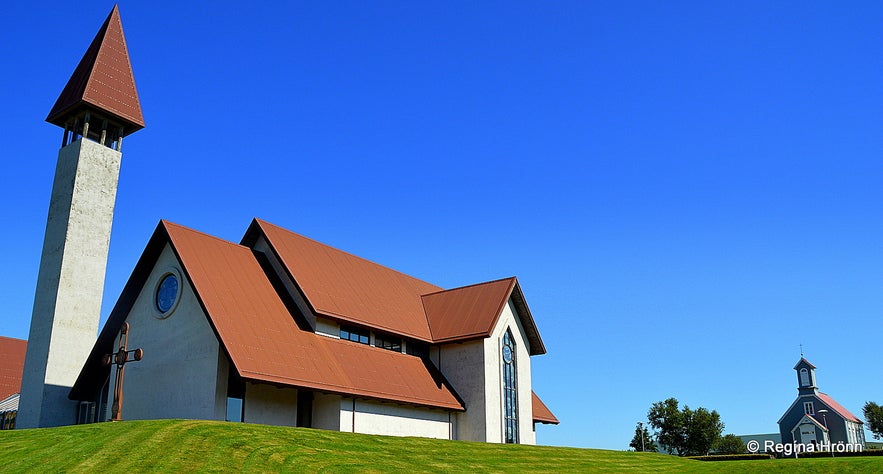
The 2 Reykholtskirkjur churches
Remember my travel-blog about the Viking battles between the most powerful Viking clans in Iceland?
In that travel-blog you can read up on what was happening at the time of the turbulent Age of the Sturlungs:
The Horrific Viking Battles in Skagafjörður, North-Iceland
Snorralaug - archaeological site
At Reykholt you will find Snorralaug, which is one of the first archaeological sites to be listed in Iceland.
You can read much more and see a good selection of photos in my travel-blog about Snorri Sturluson and Reykholt:
The Historic Reykholt in West-Iceland & Snorri Sturluson - the most influential Icelander
Hraunfossar waterfalls
Hraunfossar waterfalls
Hraunfossar waterfalls are almost 1 km wide and consist of many springs of subterranean water, welling up from underneath the lava field Hallmundarhraun. The clear water then joins the river Hvítá in Borgarfjörður, which runs from Hvítárdrög by Eiríksjökull glacier.
Hvítá river is actually a blue stream-fed river at its source, but Norðlingafljót river, which runs from the north side of Langjökull glacier gives it the milky white to greyish (in springtime) colour when it joins Hvítá river. Norðlingafljót river runs for approx. 70 km west until it joins the Hvítá river. Many more streams and rivers join these rivers.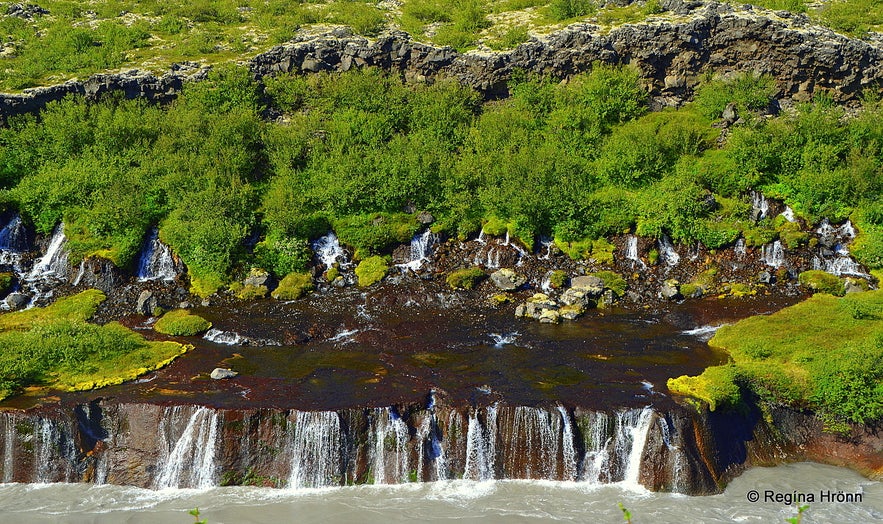
Hraunfossar waterfalls
The Hraunfossar waterfalls are a natural phenomenon. And you can get some beautiful photos here from different angles. Some of my favourite photos are from Hraunfossar.
Hallmundarhraun, from where the waterfall emerges, consists of pillow lava and is believed to have been formed in 930, shortly after the first Vikings settled here. It is named after Hallmundur who according to the Saga of Grettir lived in this area.
Hraunfossar waterfalls
Hraunfossar are amongst my most favourite waterfalls in Iceland and I have such lovely memories of sitting by the falls with my family having a picnic. The falls are fenced off now.
I shot this wobbly video of Hraunfossar to show you how beautiful this waterfall is:
This area is a national monument and declared protected since 1987.
Barnafoss waterfall
Barnafoss waterfall
Another waterfall is located by Hraunfossar, Barnafoss or Children's Falls. These waterfalls are practically next to one another, but very different. You can walk across the glacial river Hvítá on a pedestrian bridge called Barnafossbrú, which was erected in 1954 (the first bridge was built back in 1891), to see the waterfall from a different angle.
The river has dug itself down through the lava and runs in a deep and narrow ravine and you can watch the great force of the river as it forces itself through a small stone arch in the river.
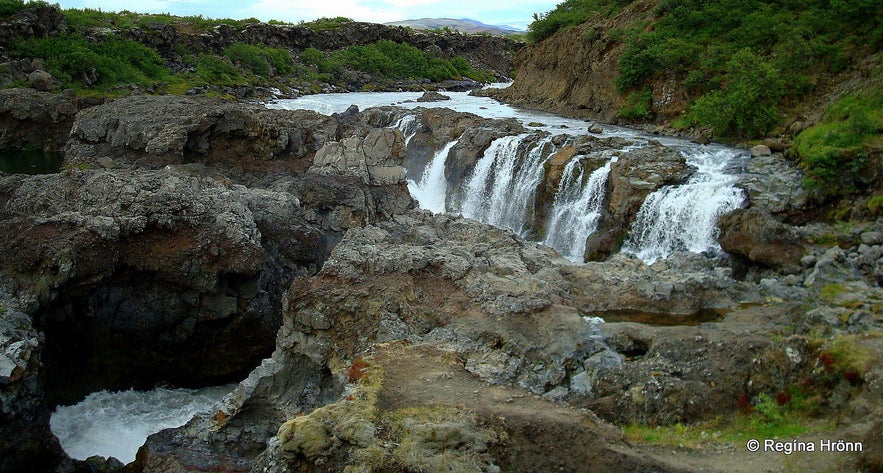
Barnafoss waterfall
There was a stone arch that used to bridge the river, and a tragic occurrence explains the disappearance of the stone arch. I found the folklore in Þjóðsögur Jóns Árnasonar - the Collection of Folklore by Jón Árnason:
"There once lived a wealthy widow at Hraunsás, she had two adolescent sons. Once the widow went with the entire household at Gilsbakki to attend mass. Her sons were to stay home alone and she warned them not to leave the farm while she was away.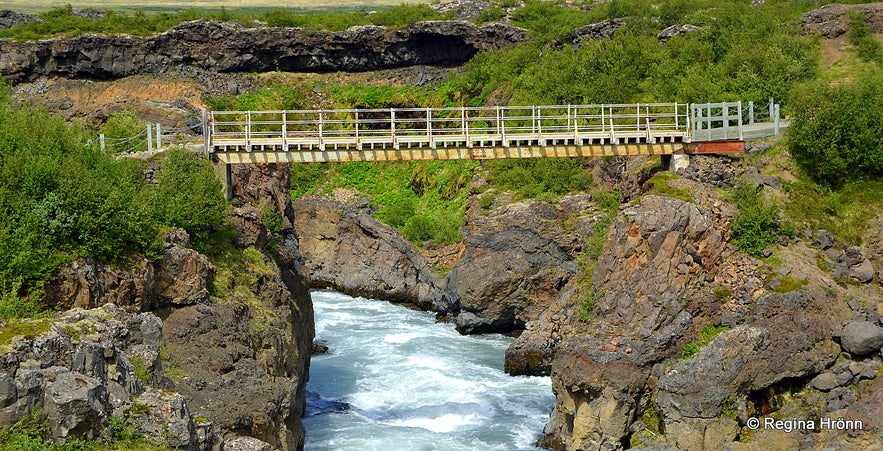
The pedestrian bridge
But as the churchgoers were gone the boys wanted to follow them and went to the river. They reached the stone arch leading across the river, but the stone arch has been described as being narrow and high above the river with a waterfall beneath it.
As the boys had reached the middle of the stone arch they looked down. They felt dizzy as they saw the whirlpool in the river and fell from the natural bridge and into the river.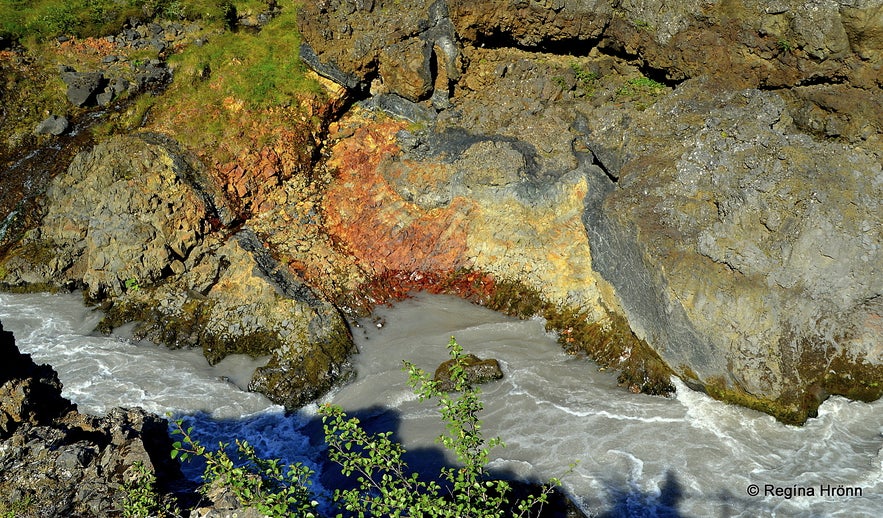
By Barnafoss waterfall
When the people returned back home the boys had vanished. Their mother sent a search party out to look for them, but in vain, the boys were nowhere to be found. She then found out what had happened; as somebody had witnessed the boys but was too late to help them.
Their mother got very angry and had the arch destroyed with the words that no man would ever be allowed to cross the river alive. From that time this waterfall, (which had been called Bjarnafoss), has been called Barnafoss - ("barn" being the Icelandic word for a child).
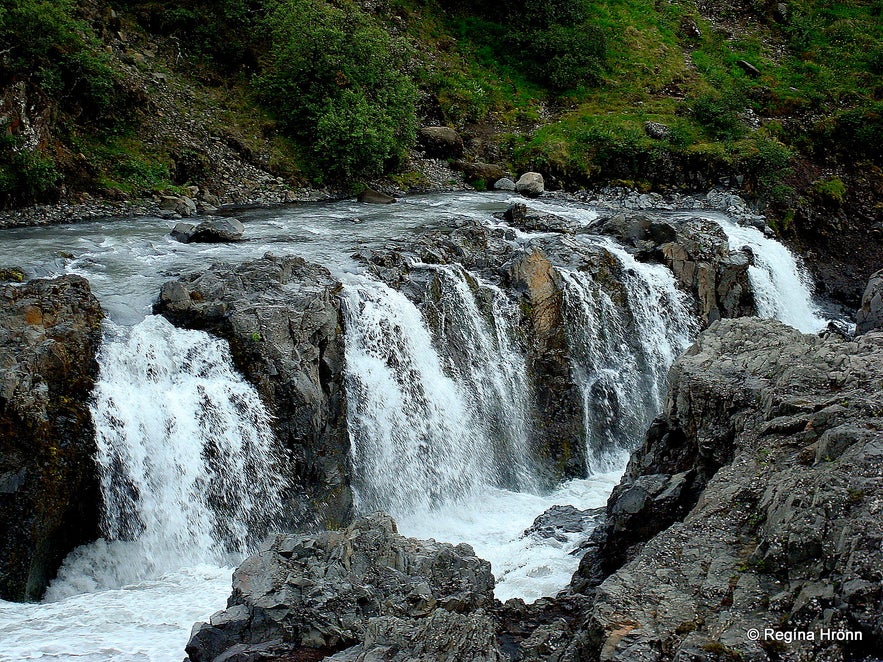
Barnafoss waterfall
The widow swore that if her children were to be found she would donate the church on the land leading to the river where they were to wash up, Norðurreyki.
And to the church where they would be buried, she would donate Hraunsás and Húsafell. But she was the owner of this land.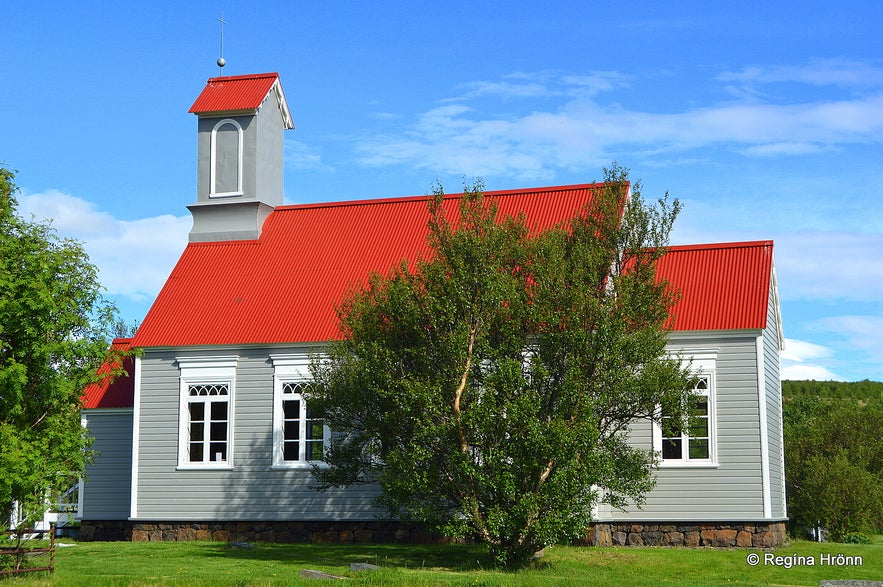
Reykholtskirkja church - the older one
Shortly after the children were found where their bodies had washed up at Norðurreykir, but that land belongs to Reykjaholtssókn parish. The boys were buried at Reykholt, and thus Reykholtskirkja church got all this land.
Whether this story is true or not all this land belongs to the Reykjaholtskirkja church".
(Translated into English from Þjóðsögur Jóns Árnasonar - the Collection of Folklore of Jón Árnason Volume II pages 105-106)
Húsafell
Húsafell restaurant
Húsafell is a hub on the Silver Circle where you will find a campsite, Hotel Húsafell, a small grocery store and restaurants. On the tours I have joined of this area we usually stopped at the restaurant of Húsafell Bistro (see my photo above). And once we stopped at the restaurant of Brúarás Geo Center.
If you are travelling on your own then Húsafell would be a good choice for an overnight stay. From here you can be picked up for the Into the Glacier tours.
Húsafell - Snorri and Páll
Húsafell
You can also stop by the famous stone Kvíahellan a.k.a. Húsafellshellan - the Húsafell's Stone. It is a strength testing stone of some 180 kilos!
You will find the strength testing stone by a sheepcote, Kvíarnar, made of stone by Reverend Snorri (1710-1803), where sheep were milked. Húsafell's Stone was used for closing the sheepcote.
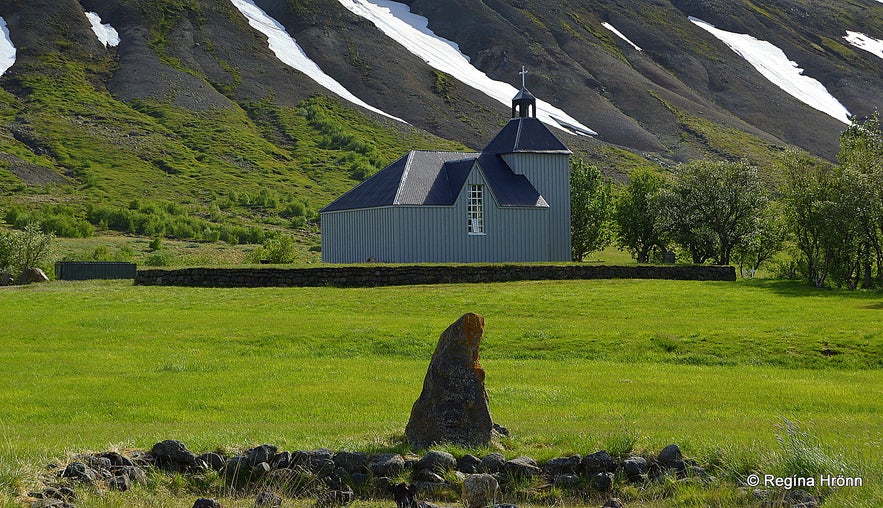
Húsafellskirkja church and Draugarétt where Snorri would get rid of the 18 ghosts!
Snorri Björnsson was very strong and was it was believed that he knew sorcery. He was renowned for exercising ghosts and is believed to have exercised around 18 ghosts! These ghosts were sent to him by his enemies.
Páll was a reverend at Húsafellskirkja church from 1757-1796, but the current church at Húsafell was consecrated in 1973.
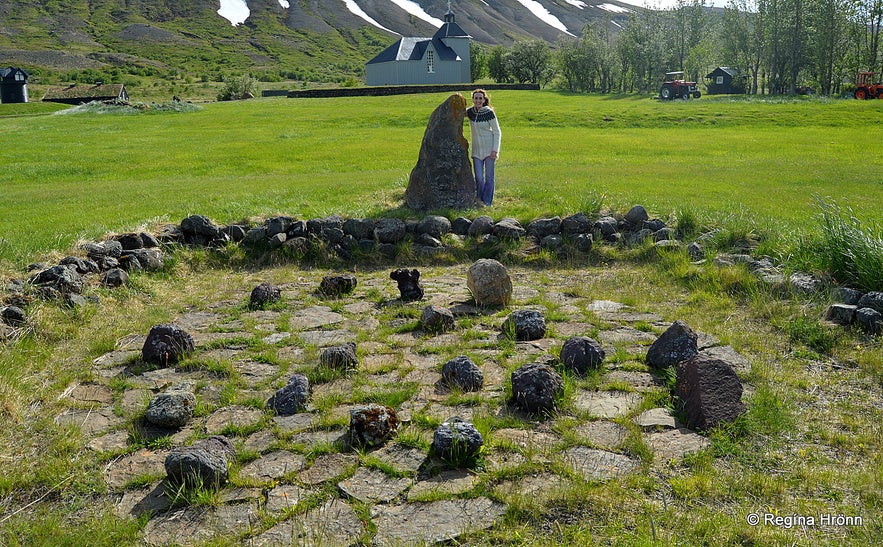
18 stones for 18 ghosts!
You can also have a look at the beautiful work of art by Páll in Húsafell, a descendant of Reverend Snorri.
Páll is famous for beautifully carving faces in stone and you can see his work in many places in Iceland.
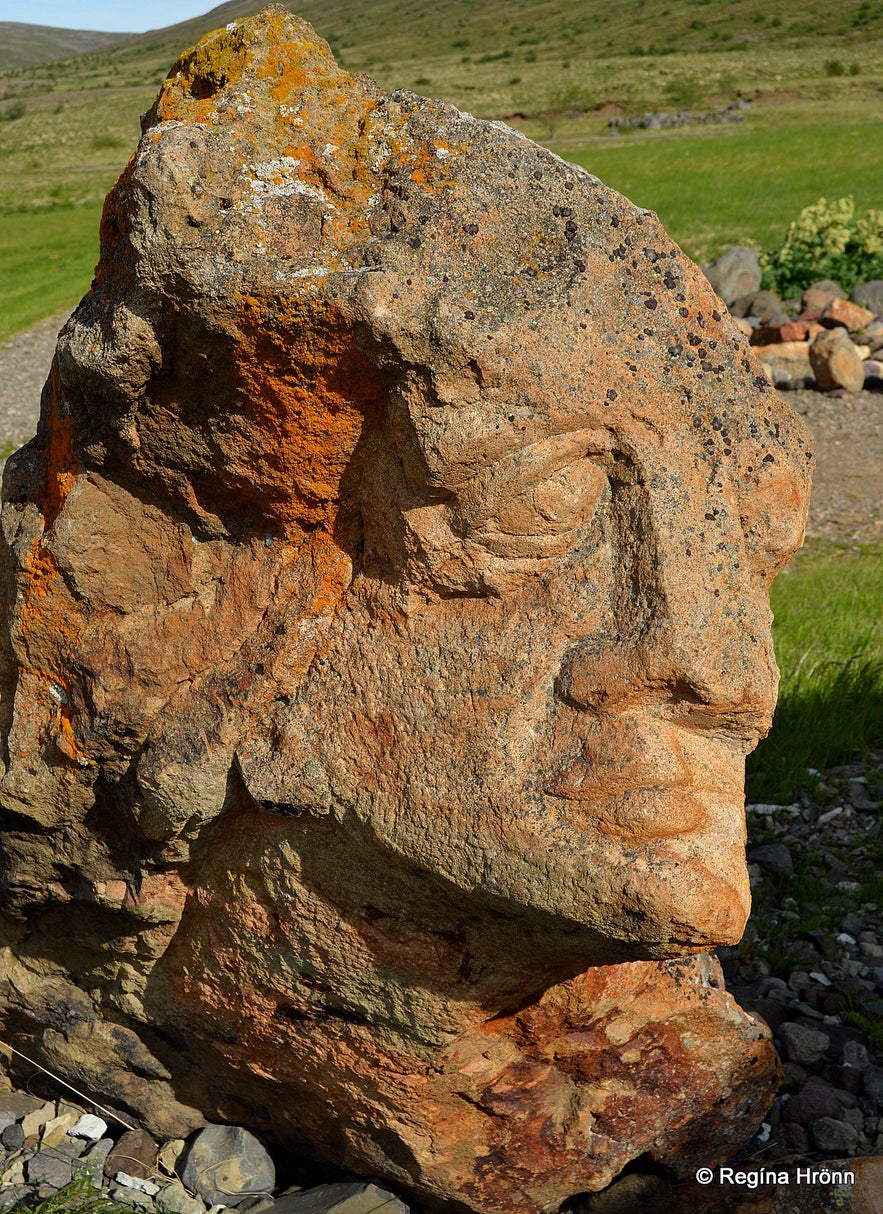
Beautiful work of art by Páll at Húsafell
If you walk up to the Bæjargil ravine, you will notice rocks in nature with faces chiselled into them. According to Þjóðsögur Jóns Árnasonar - the Collection of Folklore by Jón Árnason, there is a ghost in the ravine:
"In the mountain south of the farm at Húsafell, you will find a large ravine. It runs from the east part of the field and into the river Hvítá in Borgarfjörður. In the ravine, Bæjargil, you will find a waterfall.
The story goes that beneath this waterfall or right by it a man buried his treasure while he was still alive.
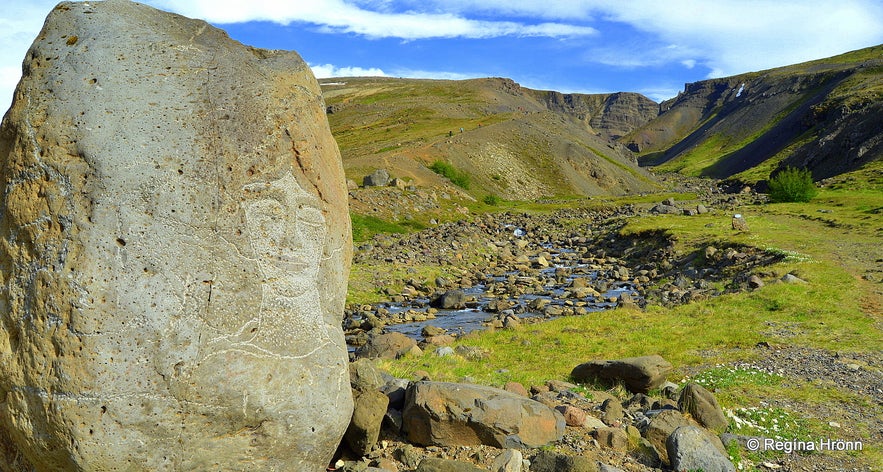
Bæjargil at Húsafell
He later died without the story stating how. Soon people noticed that he had returned as a ghost to check on his treasure by the waterfall. This ghost has often been seen; he is small and dressed in a black or rust-brown parka.
He visits the farm (at Húsafell) in the south-east wind, but doesn't harm anybody there nor anywhere else, as far as is known."
(Translated into English from Þjóðsögur Jóns Árnasonar - the Collection of Folklore by Jón Árnason)
Into the Glacier
The Ice Cave tunnel - Into the Glacier
One of the caves on the Silver Circle is man-made - the Ice Cave Tunnel - Into the Glacier, which is a tunnel inside Iceland's second-largest glacier, Langjökull.
You will be driven to the edge of Langjökull glacier where you will be greeted by a huge 8-wheel monster glacier truck, a former NATO missile-launcher truck! The drive to the ice cave tunnel in this glacier truck takes some 40 minutes.
Inside Langjökull glacier
Inside the glacier, you will be guided through 5 ice chambers, where you can examine the blue ice of the glacier. The tunnel reaches some 30 metres into the glacier and is some 550 metres long! It is quite a unique experience visiting this glacier.
I have visited it twice and can recommend this thrilling experience.
You can see one of my travel-blogs here:
A Visit to the Ice Cave Tunnel in Langjökull Glacier in Iceland - Into the Glacier
Víðgelmir - the Cave
Deep inside Víðgelmir lava cave - the Cave surrounded by the most vivid colours
The other cave is a very colourful lava cave in Hallmundarhraun lava field called Víðgelmir. I have also visited it twice and never get enough of this extraordinary cave.
Víðgelmir, which is amongst the largest lava caves in Iceland, is huge, some 1,585 km long, 16.5 metres at its widest and up to 15.8 metre's high! In cubic metres (m3) Víðgelmir measures up to 148,000 m3, making it one of the largest lava caves of this measure in the world.
Lava colours in Víðgelmir Cave
Víðgelmir - the Cave is now very easily accessible and timber stairs and walkways have been added. In this cave, you will see extraordinary lava formations and various lava colours.
You can see many more photos and information about Víðgelmir - the Cave in my travel-blog:
The Extraordinary Lava Formations and Colours in Víðgelmir Lava Cave in West-Iceland
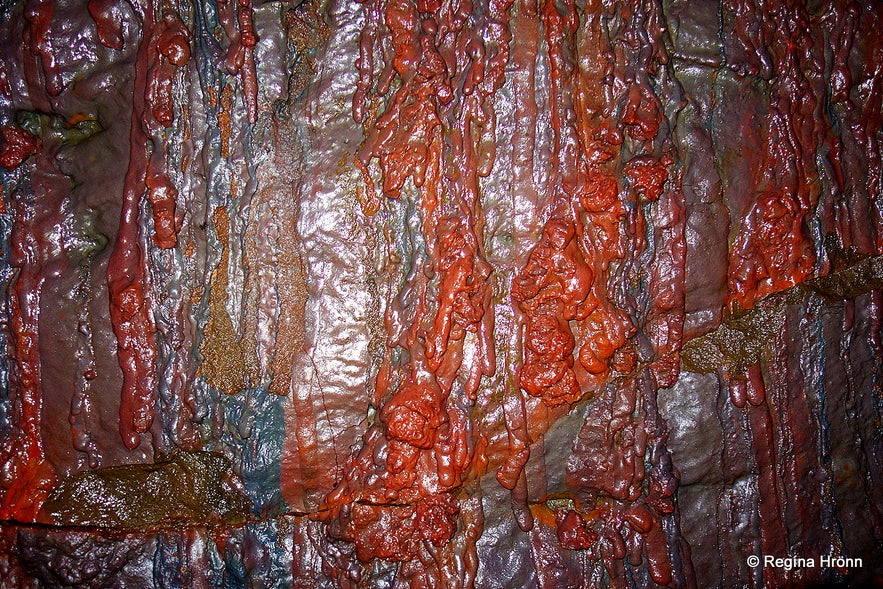
Extraordinary colours inside Víðgelmir lava cave
If you fancy visiting this colourful cave, then you can buy a family-friendly tour inside the cave here: The Cave Explorer | Family Friendly Tour of Vidgelmir Lava Cave. You can also join a combined tour of Into the Glacier with lava caving.
See also:
A Local's Favourite Caves in Iceland
Þingvellir National Park
Þingvellir national park
The Silver Circle will then take you across Kaldidalur highland track, and to Þingvellir, one of the main stops on the Golden Circle. Þingvellir national park is the most sacred place in Iceland, in my opinion.
At Þingvellir the Vikings, the descendants of the settlers of Iceland, established their parliament Alþingi in 930 and it is one of the rare places in the world where you can see the tectonic plates above ground.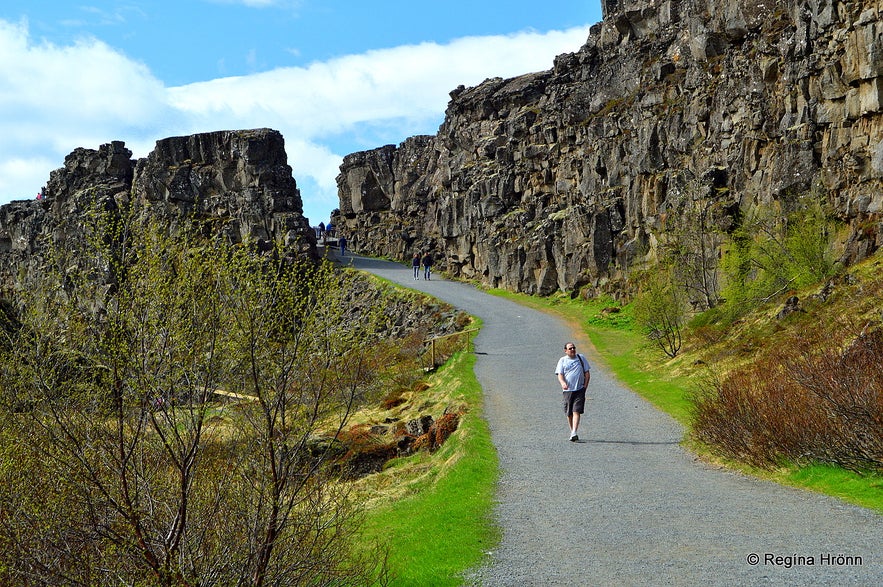
Almannagjá at Þingvellir national park
Þingvellir national park is the last stop on the Silver Circle, but of course, there are many variations to this circle and more stops can be included and others omitted.
You can drive half the circle and visit Deildartunguhver, Krauma and the 2 waterfalls, or stay f.ex. at Hotel Húsafell for the night and visit all the stops on the Silver Circle in 2 days.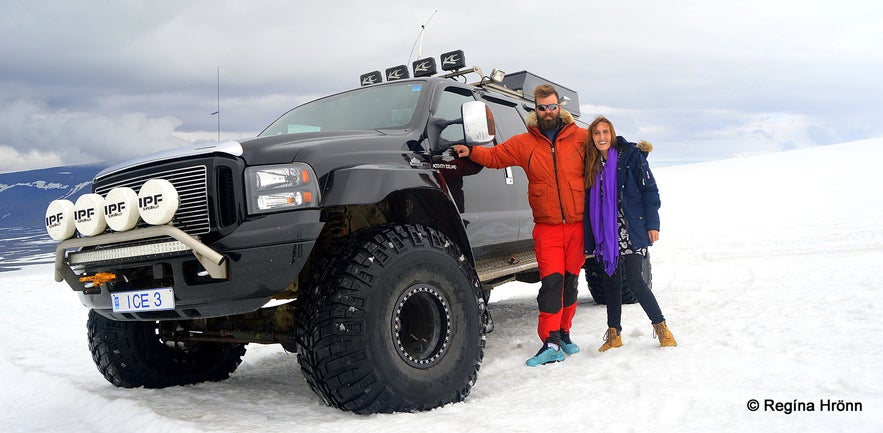
Visiting the Silver Circle in a huge jeep - see my travel-blog The beautiful Silver Circle of Iceland in a modified Super Jeep
To visit the Silver Circle on your own you can rent a jeep in Reykjavík. From ring-road 1 turn right on road 50 just before you reach the bridge by Borgarnes town.
Kaldidalur highland track
Other sights in the vicinity of the Silver Circle:
Lundarreykjadalur Valley in West-Iceland - the Natural Hot Pools Krosslaug and Englandshver
The majestic Waterfall Hvítserkur in Fitjaá River in West-Iceland
Hiking on Mt. Hestfjall in West-Iceland - a Visit to Andakílsá River and a dip in a Hot pool
I created this map to show you what I consider to be the main sights on the Silver Circle.
Have a lovely time visiting the Silver Circle and hot springs of West Iceland :)
Otros blogs interesantes
Chasing Waterfalls in Iceland
Iceland is spectacular in so many ways and Icelandic nature is quite unique with its vast landscape, volcanic activity, geothermal areas, glacier lagoons and sceneries, black sand beaches and spectLeer másSænautasel Turf House in the Highland of Iceland
In my search for turf houses around Iceland, I visited Sænautasel, which is a rebuilt turf house on Jökuldalsheiði heath in the highland of Iceland. It is, in my opinion, an extremely cute turf hoLeer másThe Dynamic Plant Lupine
People have been asking me where to find lupines in Iceland. If you like them you should be able to find them easily in Iceland in summer. They are in bloom and visible almost wherever you drive aroLeer más

Descarga la mayor plataforma de viajes a Islandia en tu móvil para gestionar tu viaje al completo desde un solo sitio
Escanea este código QR con la cámara de tu móvil y pulsa en el enlace que aparece para añadir la mayor plataforma de viajes a Islandia a tu bolsillo. Indica tu número de teléfono o dirección de correo electrónico para recibir un SMS o correo electrónico con el enlace de descarga.
